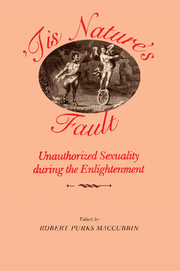Book contents
- Frontmatter
- Contents
- Introduction
- “The Secrets of Generation Display'd”: Aristotle's Master-piece in Eighteenth-Century England
- Sexual Imagination as Revealed in the Traité des superstitions of Abbé Jean-Baptiste Thiers
- Married but not Churched: Plebeian Sexual Relations and Marital Nonconformity in Eighteenth-Century Britain
- Moral Values in “La Suite de l'Entretien”
- Prostitution and Reform in Eighteenth-Century England
- The Properties of Libertinism
- Between the Licit and the Illicit: the Sexuality of the King
- The Sublimations of a Fetishist: Restif de la Bretonne (1734-1806)
- Sodomitical Subcultures, Sodomitical Roles, and the Gender Revolution of the Eighteenth Century: The Recent Historiography
- The Priest, the Philosopher, and Homosexuality in Enlightenment France
- The Pursuit of Homosexuality in the Eighteenth Century: “Utterly Confused Category” and/or Rich Repository?
- Sodomy in the Dutch Republic during the Eighteenth Century
- Parisian Homosexuals Create a Lifestyle, 1700-1750: The Police Archives
- The Censor Censured: Expurgating Memoirs of a Woman of Pleasure
- Chthonic and Pelagic Metaphorization in Eighteenth-Century English Erotica
- Modes of Discourse and the Language of Sexual Reference in Eighteenth-Century French Fiction
- The Mélange de poésies diverses (1781) and the Diffusion of Manuscript Pornography in Eighteenth-Century France
- Obscene Literature in Eighteenth-Century Italy: an Historical and Bibliographical Note
Obscene Literature in Eighteenth-Century Italy: an Historical and Bibliographical Note
Published online by Cambridge University Press: 06 July 2010
- Frontmatter
- Contents
- Introduction
- “The Secrets of Generation Display'd”: Aristotle's Master-piece in Eighteenth-Century England
- Sexual Imagination as Revealed in the Traité des superstitions of Abbé Jean-Baptiste Thiers
- Married but not Churched: Plebeian Sexual Relations and Marital Nonconformity in Eighteenth-Century Britain
- Moral Values in “La Suite de l'Entretien”
- Prostitution and Reform in Eighteenth-Century England
- The Properties of Libertinism
- Between the Licit and the Illicit: the Sexuality of the King
- The Sublimations of a Fetishist: Restif de la Bretonne (1734-1806)
- Sodomitical Subcultures, Sodomitical Roles, and the Gender Revolution of the Eighteenth Century: The Recent Historiography
- The Priest, the Philosopher, and Homosexuality in Enlightenment France
- The Pursuit of Homosexuality in the Eighteenth Century: “Utterly Confused Category” and/or Rich Repository?
- Sodomy in the Dutch Republic during the Eighteenth Century
- Parisian Homosexuals Create a Lifestyle, 1700-1750: The Police Archives
- The Censor Censured: Expurgating Memoirs of a Woman of Pleasure
- Chthonic and Pelagic Metaphorization in Eighteenth-Century English Erotica
- Modes of Discourse and the Language of Sexual Reference in Eighteenth-Century French Fiction
- The Mélange de poésies diverses (1781) and the Diffusion of Manuscript Pornography in Eighteenth-Century France
- Obscene Literature in Eighteenth-Century Italy: an Historical and Bibliographical Note
Summary
Conscius ecce duos accepit lectus amantes:
Ad thalami clausas. Musa, resiste fores!
[Behold, a guilty bed received two lovers:
Stop at the chamber's closed doors, O Muse!]
Ovid, Ars amandi, II, 703-04In the eighteenth century, foreigner travelers like Montesquieu found Italy a magnificent but dusty museum. Yet in the general conception of European men of letters, especially in the second half of the century, the peninsula also became the exotic stage for aberrant passions. “Aberrance”—the word evokes that dération which had enjoyed its moment of glory in the courts of the Renaissance, and which was dear not only to Stendhal, but to Gothic novelists, to Elizabethan dramatists, to Shakespeare, and to Meissner, Tieck, and Schlegel.
The Marquis de Sade was in Italy from 1775 to 1776, and described it as a marvelous country (“le plus beaux pays de l'univers”), but one inhabited by the most decadent race (“habité par l'espèce la plus abrutie”). This latter fact so delighted him that he chose the area between Turin and Naples as the site for the journey of debauchery which constitutes more than half of Juliette's interminable adventures. Casanova's Mémoires, although scarcely a reliable source, corroborate the Marquis' observations. And it was precisely the historical reality of this darker world which fueled the imagination of Stendhal in his Chroniques italiennes. His tales of Accoramboni and the Borgias, of Pier Luigi sodomizing the bishop of Fano, and of Francesco Cenci raping his own daughter are all well-documented historical facts.
- Type
- Chapter
- Information
- 'Tis Nature's FaultUnauthorized Sexuality during the Enlightenment, pp. 244 - 260Publisher: Cambridge University PressPrint publication year: 1988
- 1
- Cited by



